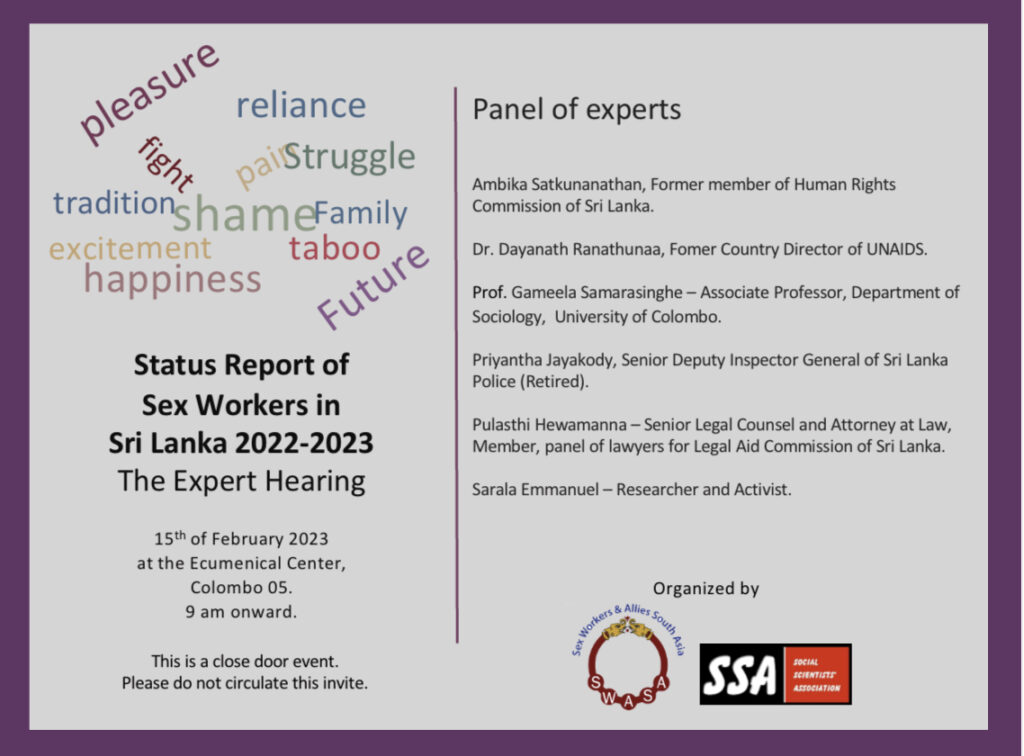Experts’ Panel to hear testimonies of Sex Workers from seven districts in Sri Lanka A brief report Sex Workers and Allies South Asia (SWASA), Sri Lanka
In a first ever effort jointly organized by the Sex Workers and Allies South Asia (SWASA), Sri Lanka and the Social Scientists Association, six experts across diverse relevant fields were brought together to listen to testimonies from thirty sex workers from across Sri Lanka. Hailing from Colombo, Gampaha, Jaffna, Kandy, Polonnaruwa, Puttalam and Vavuniya, this was the first time for all of the workers to present their story to a formally convened Experts’ Panel. The anonymity and safety of the workers were assured to them and systems were put in place to ensure that their names, places of residence or any other identifying information is not available even to the Experts. Given the atmosphere of legal/extra-legal criminalization of sex work along with the context of profound social stigma, this assurance of safety was essential for the workers to open up.
The Expert Panel consisted of Retired DIG Priyantha Jayakody, Former member of the Human Rights Commission Ambika Satkunanathan, Pulasthi Hewamanne, Attorney and Lawyer working extensively on Fundamental Rights issues, Dr. Dayanath Ranatunga, Former Country Director of UNAIDS, Gameela Samarasinghe, Clinical Psychologist by training and an Associate Professor in Psychology in the Department of Sociology, University of Colombo and Sarala Emmanuel, researcher and activist with 20 years experience of working with a range of marginalized communities in Sri Lanka. This esteemed panel listened in pairs to the workers. Each worker spoke for about ten minutes.
The process of doing such work is as important the end result. What follows is a small description of the process. The rooms we used at the Ecumenical Centre that had kindly rented their space to us was abuzz with interest. The workers had set up the rooms themselves to ensure that there was enough space between each team of experts. Each pair were given one person to transcribe the proceedings, a translator and a time keeper who was also part of the organizing team and thus known and trusted by the workers. In these small groups the space was created for the workers to put forward their testimonies.
This event was possible through a few key preparatory processes. First, it comes after consistent work among sex workers in these districts by partners who are part of the Sex Workers and Allies South Asia network. These include the Stand Up Movement, Praja Deriya Padanama, Grassrooted Trust, Trans Equality Trust and SWASA North. Through these partner organisations small groups of workers had been meeting every month for the past three years. Through this process familiarity and trust has been built. With this trust as the foundation, the meetings and the annual/bi-annual national meetings/trainings have created co-learning spaces through which a small but potent group of leaders/organizers’ have emerged from among the workers. It is in this context that the plan was made to undertake a peer-researched extensive national survey on the status of sex workers in Sri Lanka, the first of its kind. This report, being collated with the support of the Social Scientists Association, will be released in and around May 1st, International Workers Day, to affirm that sex work is work. This Experts’ Panel was organized to generate input from Experts from different fields to include within this report.
The preparation for the testimonies at the expert panel were also based on this longstanding trust and made full use of workers having been emboldened to speak up for themselves with clarity and conviction. The evening before the training a meeting was held with of all thirty workers who will provide testimonies. Within each group present, the stories or incidents they were to present was shared. This was then compared with the range of issues which were already identified during the earlier discussions to ensure that all of them were covered in the testimonies. These broadly included, legal issues, non-inclusion in state provided social safety nets, health related issues, debilitating economic challenges, violence in different spaces inhabited by workers in their everyday lives etc. While not by any means exhaustive, this rubric provided a way to ensure that the testimonials are able to ably represent the everyday lives, challenges and dire conditions in which sex workers in Sri Lanka live.
The Experts, after listening to the workers, were asked to present their initial thoughts on what they had heard. Often in such panels, those marginalized provide testimony and do not always get to hear back from those with whom they have shared their heart-wrenching stories. The Experts spoke one by one in Sinhala or Tamil so that at least some of the workers could understand them directly. All proceedings were translated from Sinhala to Tamil and vice versa. Mr. Priyantha Jayakody shared strongly that all persons are equal in the eyes of the law and that today he has heard the ways in which this fundamental principle is constantly flouted with regards to sex workers in Sri Lanka. He affirmed the need to build awareness of sex workers issues, lives and challenges among law enforcement officials, specifically those of his field, the police, to ensure that, in the future, sex workers are treated as equal citizens and human beings, especially given that sex work per say is not Criminal as per Sri Lankan law. Dr. Dayanath Ranatunga affirmed that health is a fundamental human right. Sex workers facing stigma and discrimination within the health system should be seen not as their fault or responsibility but that of the state. He insisted that workers must think of their right to health as something they are entitled to and claim it with ownership. Dr. Gameela Samarasinghe echoed some of Dr. Ranatunga’s opinions when she mentioned that workers must think of taking care of themselves as being an essential part of their lives. She observed that all the workers she listened to were struggling with major issues of anxiety and depression. Living in constant fear of different conditions of life or any attack on personal physical/emotional safety is not an ideal state of being. She affirmed that workers must acknowledge this and prioritize themselves. Advocate Pulasthi Hewamanne expressed shock at the kind of blatant violations of the law that workers have had to endure. He insisted that in small but significant ways administrative, civil and criminal laws must be pushed to not continue to violate the fundamental rights of this severely marginalized group in Sri Lankan society. Ms. Ambika Satkunanathan added to this insight by observing that there is a general consensus around non-legal practices within the legal system when it comes to sex work. Police, lawyers, even judges all agree upon a range of practices that are actually not prescribed by the law and yet are regularly practiced. She too emphasized the need to begin to challenge such practices in small and big ways consistently. Ms. Sarala Emmanuel brought focus to the amount of caregiving that sex workers are engaged in as most of the workers are primary earning members and caretakers of their families. She pointed out that many responsibilities that are of the state, for instance to provide assistance to care for dependents who are unable to care for themselves, is done by sex workers. Thus, she stated that sex workers are actually helping the state with the burden of caring for all sections of society. She affirmed that the workers must see themselves as those contributing positively to society and deserve equal rights and lives of dignity and respect.
The workers were moved and affirmed by the words of these respected experts. The event ended with lunch for all and good byes were said with the promise of meeting again in the long struggle for the rights of sex workers in Sri Lanka.
The next step for SWASA Sri Lanka in this regard, at the national level, will be the release of the report that shall be done in Colombo. Till then, workers are continuing to meet and their training in law and health and many other areas such as artistic expression to contribute to the struggle for rights, will continue. After the release of the report, it will serve as a concrete tool to converse with many others in Sri Lankan society who are engaged in ensuring the rights of the marginalized, and urge them to include sex workers within their purview.

